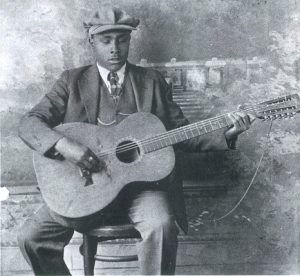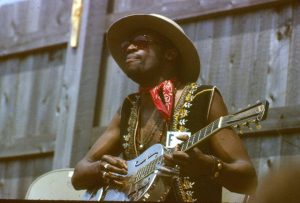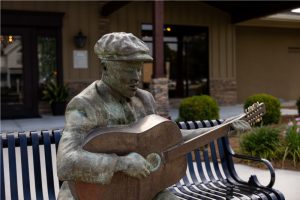Blind Willie McTell was a celebrated blues singer, songwriter, and guitarist known for his contributions to Piedmont blues and ragtime. He is perhaps best known for writing the iconic song “Statesboro Blues.” Born in Thomson, Georgia, McTell moved to Statesboro with his mother, where he learned to play the six-string guitar. Eventually, he transitioned to the 12-string guitar, which became his signature instrument for the rest of his career.

Photo: Blind Willie McTell
After his mother’s passing, McTell left Statesboro and began traveling the country, performing from Atlanta to New York. In 1928, he recorded “Statesboro Blues” with the Victor Talking Machine Company, a song that would leave a lasting legacy on blues and rock music.

Photo: Taj Mahal, 1968
The song gained renewed recognition decades later, first through Taj Mahal’s 1968 version and then in 1971 when the Allman Brothers Band released their electrifying cover of the track. The Allman Brothers’ story of how they came to cover “Statesboro Blues” has become legendary in its own right. Duane Allman, while recovering from an illness, was introduced to Taj Mahal’s version by his brother, Gregg Allman.

Photo: The Allman Brothers Band
Inspired by the bluesy slide guitar sound, Duane famously taught himself to play slide guitar using a glass Coricidin medicine bottle as a slide. This bottleneck technique became a hallmark of his playing and helped define the Allman Brothers’ rendition of the song, recorded live at Fillmore East.

Photo: Duane Allman
Their version has since earned critical acclaim, with Rolling Stone placing it at number nine on their list of the “100 Greatest Songs of All Time.” The song remains a staple of classic rock radio, introducing new generations to McTell’s music and drawing countless visitors to Statesboro each year.

Photo: Blind Willie McTell statue at Visit Statesboro
In honor of Blind Willie McTell’s legacy, the Statesboro Blue Mile Committee commissioned a statue in his likeness, now proudly displayed at the entrance of the Statesboro Convention and Visitors Bureau.
McTell’s contributions to music were posthumously recognized when he was inducted into the Blues Hall of Fame in 1981 and the Georgia Music Hall of Fame in 1990.
Have a Listen!
You can enjoy all three recorded versions of “Statesboro Blues” here:


